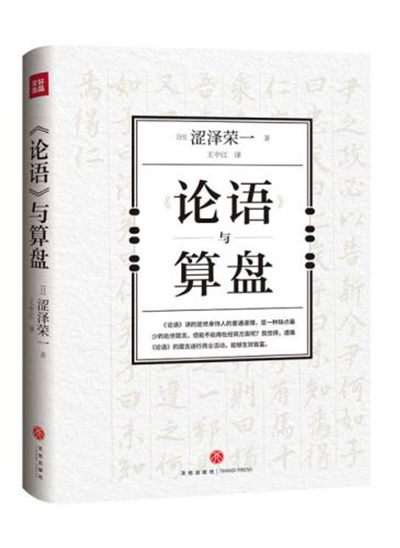A harmonious paragon integrating morality and business

The Analects and the Abacus
The Analects and the Abacus, by Shibusawa Eiichi (1840–1931), a Meiji-era business leader, also known as the “father of Japanese capitalism,” gives creative answers to the major issues in the modern transformation of East Asian civilization. The book is translated by Wang Zhongjiang, a professor from the Department of Philosophy and Religious Studies at Peking University.
Influenced by the pan-moral theory of Neo-Confucianism in the Song (960–1279) and Ming (1368–1644) dynasties and the misunderstanding of Confucian classics, many believed that commerce and morality are either not positively correlated or are fundamentally opposed. Such misconception even attained a certain “orthodox” status in late ancient East Asia. This so-called orthodoxy, with its emphasis on moral absolutism and the resulting moral domination of industry and commerce, deeply influenced the social hierarchy of East Asian countries such as China, Korea, and Japan. In these societies, the status and position of scholar-bureaucrats (including samurai) far exceeded that of industrialists and businessmen.
Scholar-bureaucrats continued to enjoy far more prestige than merchants at national, institutional, and cultural levels despite the rapid growth of commercial civilization in East Asia after the middle and late Ming (the 16th century), and even the budding of capitalism, the prosperity of secularist culture, and the rising status of merchants. This distinction is not only demonstrated in the sense of identity and social stratum, but also in the sense of cultural values.
The modernization pioneered by the Western world has witnessed the flourishing of industry and commerce, alongside the establishment of democratic systems, while realizing a substantial transformation in cultural concepts—the profound combination of business and morality, a concept extensively explored by Max Weber in his analysis of the relationship between capitalism and the Protestant ethic. Weber posited that the emergence of new moral principles among the Puritans fundamentally altered societal attitudes towards economic pursuits, thereby driving the advancement of capitalism and secularization. He also extended this perspective of sociology of religion to other civilizations such as China and India, arguing that the core ideas of these civilizations lacked the capacity to drive secularization and capitalism.
In this regard, the book serves as a theoretical and empirical response to Weber’s problem in the context of East Asia. Though Shibusawa joined politics in his early years, he later abandoned it to take up business, engaged in industry and commerce all his life while also devoting himself to studying The Analects of Confucius. Through his endeavors, he shed light on the profound connection between morality and commerce, both in theoretical discourse and practical application. He demonstrated that the moral traditions and cultural concepts of East Asia can also be combined with commercial culture and modern civilization. The Analects of Confucius and the “abacus” have transcended the historical divide of late antiquity, acquiring enduring connections in the modern world, exemplifying the modern transformation of East Asian civilization.
Wang Zheng is a senior editor from the Institute of Philosophy at the Chinese Academy of Social Sciences.
Edited by YANG LANLAN
